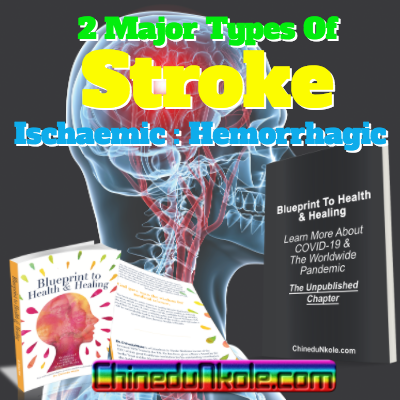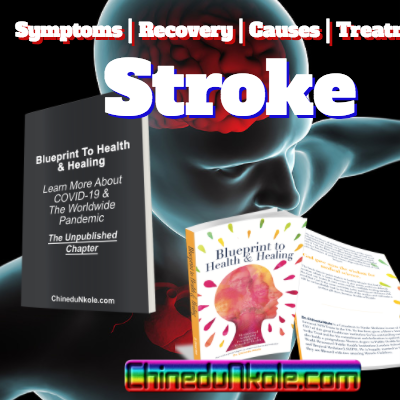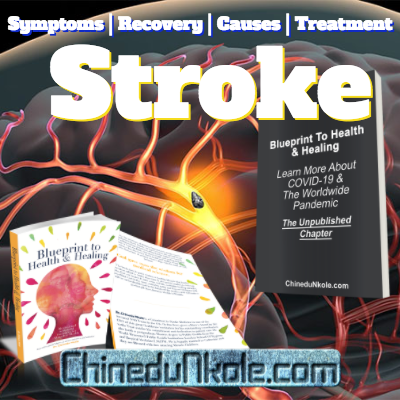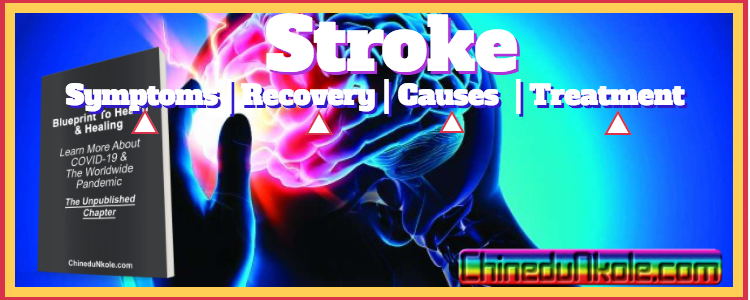A stroke is a serious life-threatening medical condition that happens when the blood supply to part of the brain is cut off. A brief note on the pathophysiology can be found in my book : Blueprint to Health and Healing. Types of stroke :-
There are 2 major types of stroke Ischaemic and Haemorrhagic strokes :-
Ischaemic Strokes
… are caused by a blood clot within the artery resulting in blockage that cuts off the
blood supply to the area of brain supplied by the affected artery.
It can be thrombotic (where the blood clot, a thrombus, forms within the artery) or embolic (where the blood clot, an embolus, comes from another part of the body).
This is the most common type of stroke, other types include the “Transient Ischaemic Attack” also known as a mini stroke.
Haemorrhagic strokes
… are caused by bleeding into the brain, mostly due to uncontrolled high blood pressure.

Transient Ischaemic Attack (TIA) ...
… also known as mini stroke is a type of ischaemic stroke. As the name implies, the blockage that stops the blood getting to your brain is temporary and as a result, the symptoms only last for a short amount of time. However, it is a warning that the risk factors should be mitigated to prevent a major stroke.

Cryptogenic stroke (CS) is a form of ischaemic stroke of obscure or unknown cause. One third of ischaemic
strokes are cryptogenic.
Risk Factors For Stroke ...
… Lifestyle-related factors that increase your risk of stroke include
High blood pressure.
Cigarette smoking.
Diabetes.
High blood cholesterol levels.
Heavy drinking.
A diet high in fat (particularly saturated) and salt, but low in fibre, fruit & vegetables.
Lack of regular exercise.
Obesity.
I addressed how the above risk factors can be mitigated in my book : Blueprint to Health and Healing (available on Amazon).
Other Risk Factors For Ischaemic Stroke
Irregular heart Beat, atrial fibrillation- People with this condition need to be on blood thinners to prevent stroke.
Heriditary / Genetic risk factors
Below are some hereditary / genetic stroke risk factors (This list is not exhaustive) :- Antiphospholipid Antibody Syndrome (APS). CADASIL (cerebral autosomal-dominant arteriopathy with subcortical infarcts and leukoencephalopathy). CARASIL (cerebral autosomal recessive arteriopathy with subcortical infarcts and leucoencephalopathy) Cerebrotendinous xanthomatosis. Ehlers-Danlos syndrome. Fabry disease Vasculitis Giant cell arteritis (GCA) Sickle Cell Disease.
Causes of Hemorrhagic Strokes :
High blood pressure.
Injury. Bleeding disorders.
Cocaine use. Abnormal blood vessels (AVMs-arterovenous malformations) Aneurysm (a weak area in a blood vessel that breaks open) Amyloid angiopathy

Signs and symptoms of stroke : Sudden numbness or weakness in the face, arm, or leg, especially on one side of the body Sudden confusion, trouble speaking, or difficulty understanding speech. Sudden trouble seeing in one or both eyes Sudden trouble walking, dizziness, loss of balance, or lack of coordination. Sudden severe headache with no known cause.
If you think someone may be having a stroke, act F.A.S.T.
… and do the following simple tests:
F—Face : Ask the person to smile. Does one side of the face droop?
A—Arms : Ask the person to raise both arms. Does one arm drift downward?
S—Speech : Ask the person to repeat a simple phrase. Is the speech slurred or strange?
T—Time : If you see any of these signs, call an ambulance right away. Please it is very important to note the time of onset of symptoms as this will guide the choice of treatment modality.

